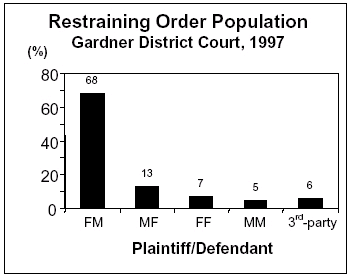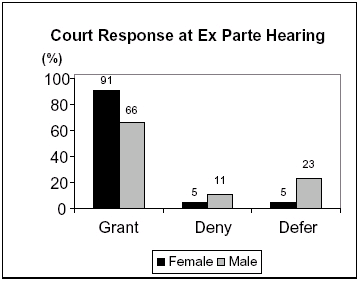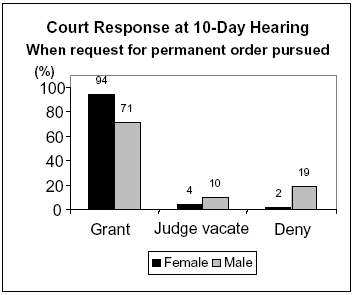Milford, July 11, 2005 – A
study of how one court in
Massachusetts applies the
abuse prevention statute (MGL
ch.209A) as measured by the
issuance of “209A restraining
orders” has just been published
in the June issue of Journal
of Family Violence, an academic
journal on domestic violence
issues.
“A Measure of Court Response
to Requests for Protection,”
by the Fatherhood Coalition’s
Steve Basile, examined the
209A restraining orders issued
in Gardner District Court
in 1997. The study reveals
a clear double standard in
the court response to alleged
victims of domestic abuse/violence.
In each of the benchmarks,
women plaintiffs (victims)
were treated more favorably
than men, and likewise, male
defendants were treated more
harshly than their female
counterparts.
|
|
“The message couldn’t
be clearer. If you
are a father suffering
domestic violence,
using
the legal system
to gain protection
for yourself is
a high risk proposition
that may result
in you losing custody
and even contact
with your children.”
─
Steve Basile, study
author |
|
Among the study’s findings:
- When compared with
other attributes of the
litigants, sex was by
far the greatest predictor
of whether or not a restraining
order would be issued
and of the severity of
the restrictions imposed
on the defendant.
- At ex parte hearings,
where only the victim
is present and the defendant
is unaware of the proceedings,
men were 240% more likely
than women to be denied
the immediate protection
of an emergency restraining
order.
- Women were 38% more
likely than men to be
granted an emergency protection
order at an ex parte hearing.
- At follow-up 10-day
hearings, when victims
seek an extended or new
restraining order, men
were 383% more likely
to be denied protection.
- Women were 32% more
likely than men to be
granted a new restraining
order when protection
was pursued at the follow-up10-day
hearing.
- Overall, with and without
children in common, men
were 29% more likely to
be evicted than women
and 110% more likely to
be evicted if they shared
a common child.

The
Fatherhood Coalition is especially
concerned about the use of
209A restraining orders as
“first strike” weapons in
divorce/custody battles.
The study also analyzed court
response with respect to granting
of custody of minor children
when the litigants are parents.
Mothers were 288% more likely
than fathers to receive custody
of children as a direct provision
of the 209A order. However,
in the few cases where fathers
received custody, which was
only at ex parte hearings,
none of the fathers secured
long-term custody of their
children at the 10-day hearing.
According to Basile, “The
message couldn’t be clearer.
If you are a father suffering
domestic violence,
using the legal system to
gain protection for yourself
is a high risk proposition
that may result in you losing
custody and even contact
with your children.”
The first phase of the study
was published in the Journal
in February, 2004. That report
provided a qualitative analysis
of all of 382 non-impounded
209A restraining orders issued
in the courthouse, examining
the type and degree of abuses
categorized by the sex and
relationship of the litigants.
For both phases, every available
restraining order docket from
1997 was examined, to mitigate
against any seasonal abnormalities
or any accusations of selective
sampling. Typically, domestic
violence research explicitly
excludes male victims of female
domestic violence.

While the results of the
first phase confirmed that
women disproportionately
seek legal protection from
domestic violence, the qualitative
examination of the data
in the dockets, which includes
the victim’s affidavit,
showed that the nature of
the abuse claimed was roughly
similar between men and
women.
However, the second phase
reveals a disturbingly high
correlation between the
court decisions and the
sex of the litigants.
The study analyzed the response
of the court to requests
for protection at ex parte
hearings, where only the
victim is present, and at
the follow-up 10-day hearing.
209A abuse protection orders
grant the “victim” enormous
power over their alleged
abusers. Provisions
include removal from one’s
own home, granting of immediate
custody of minor children
to the alleged victim with
a consequent assignment
of child support.
According to Coalition Spokesman
Mark Charalambous, “It’s
important to understand
that a 209A order taken
against a father, besides
removing all legal and physical
custodial rights to his
children, also extends the
no-contact provisions to
those children.”
 Since
a violation of any of the
provisions of a 209A order
is a criminal offense subject
to 2 ˝ years in jail and
$10,000 fine, any contact
a father may have with his
children, direct or third-party
or even unintentional, holds
him criminally accountable.
This is done without the
criminal protections afforded
defendants in criminal cases
because the issuance of
209A order is civil, requiring
only the minimal standard
of evidence (“preponderance”).
Since
a violation of any of the
provisions of a 209A order
is a criminal offense subject
to 2 ˝ years in jail and
$10,000 fine, any contact
a father may have with his
children, direct or third-party
or even unintentional, holds
him criminally accountable.
This is done without the
criminal protections afforded
defendants in criminal cases
because the issuance of
209A order is civil, requiring
only the minimal standard
of evidence (“preponderance”).
“This is why a 209A restraining
order is often referred
to as the nuclear first-strike
in the commencement of a
divorce action,” Charalambous
emphasizes.
The Fatherhood Coalition
is supporting the “209A
Reform Bill” (S965, H833),
presently in committee,
that addresses many of the
law’s most serious flaws.
#
# #